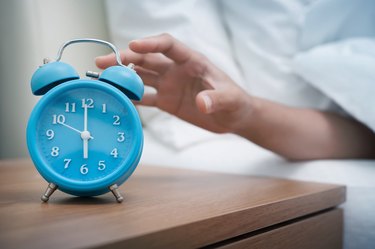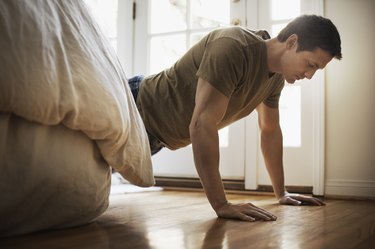
If you're one of those people who always feels sluggish when you get up in the morning, you're not alone — 86 percent of Americans reported feeling the same way in a May 2015 poll by YouGov, an international research data and analytics group.
This news will come as a welcome wakeup call, though: A January 2020 study published in PLOS One revealed a ridiculously easy way to feel refreshed and ready to tackle the day from the moment you open your eyes. All you need to do is…wait for it…swap your noisy alarm signal for a tune you can hum or sing along to.
Video of the Day
Video of the Day
"We think that a harsh 'beep beep beep' might work to disrupt or confuse our brain activity when waking," wrote study author Stuart McFarlane, "while a more melodic sound like the Beach Boys' 'Good Vibrations' or The Cure's 'Close to Me' may help us transition to a waking state in a more effective way."
In the study, 50 participants responded to an online questionnaire about their alarm sound and level of a.m. perkiness. It didn't seem to matter if people changed their alarm song throughout the week versus sticking with the same tune, or if they even liked the music — as long as it was perceived as having a melodic rhythm, it successfully slashed sleepiness. (McFarlane points out that no research has been done to observe whether this effect lasts over time.)
How to Set Your Phone Alarm to Play a Song
iPhone:
- Open up the Clock app
- Add a new alarm
- Tap Sound, and select Pick a Song to choose a tune from your library
Android:
- Open up Clock
- Add a new alarm
- Tap the bell icon, and then tap YouTube Music to find a track you like
In addition to waking up to music you can groove to, try these simple, research-based ideas that will put instant pep in your step.
1. Stick to a Sleep Schedule
Do you go to bed and get up at the same time every day, or do your sleep sessions fluctuate? (Think: turning in late if you have evening plans or are binge-watching Netflix, and letting yourself sleep in on the weekends.)
If the hours when you're catching zzzs are inconsistent, then your circadian rhythm — an internal clock regulating patterns of sleepiness and alertness — will be out of whack, which can trigger brain fog.
"Our body chemistry is programmed to work in cycles," Michael Twery, PhD, director of the National Center on Sleep Disorders Research, tells LIVESTRONG.com. "When the timing of these cycles is off, it's like an engine that doesn't run well, and you will struggle to wake up."
Indeed, according to the National Sleep Foundation, following a regular sleep schedule can make it easier to fall asleep at night and wake up in the morning.
Related Reading
When you're establishing your snooze routine, just make sure you're turning in early enough to give you ample R&R.
A December 2018 assessment published in Sleep found that logging seven to eight hours of shut-eye is ideal (although a December 2013 Gallup poll found that 40 percent of Americans get less than that).
But the National Sleep Foundation says it typically takes 10 to 20 minutes to fall asleep once you're under the covers. Let's say you get into bed at 11:00 p.m., nod off at 11:20, and your alarm goes off at 6:00 a.m. Even though you're technically between the sheets for seven hours, you're getting less sleep than recommended.
Plus, your sleep schedule should accommodates your individual sleep needs — you may require more hours than a friend who can get by on fewer hours of sleep.

The average smartphone has a preset snooze time of nine to 10 minutes, which is long enough for you to begin drifting off to dreamland again. But right when your body prepares to enter another sleep stage, you're jolted awake again, confusing your brain and leaving you in a semi-lucid state.
"As a result, you won't feel refreshed," says sleep specialist Michael Breus, PhD, author of The Power of When.
Tip
Put your alarm on the other side of the room so you physically can’t reach out and tap snooze.
3. Just Breathe
As soon as you wake, sit up in bed and inhale and exhale deeply for about two minutes, taking long, slow, big breaths of air to infuse your cells with oxygen.
"Your respiratory system slows while you sleep," Breus says. "Getting lungfuls of oxygen kickstarts it again."
In turn, your increased circulation will lift your energy levels, he says.

4. Grab Your Water Bottle
Here's why you feel parched in the morning: "Sleep is dehydrative," Breus says. "On average, people lose a liter of water during the night, depending on the humidity level in your bedroom and your breathing patterns — like if you sleep with your mouth open or closed."
Since water transports oxygen to your muscles and brain, dehydration can lead to physical and mental grogginess. To replenish your cells and perk up, guzzle at least 16 ounces of H2O.
Related Reading
5. Let the Sunshine In
Bright light is a powerful energy booster because it puts the brakes on melatonin, the "sleepiness hormone" that your brain churns out in order to start sleep.
Since darkness triggers melatonin's release, you can counteract its snooze-inducing effects by opening your shades to let in sunlight. Or go a step further and get outside for natural light exposure. "When sunlight hits the melanopsin cells in your eyes, it turns off the melatonin faucet in your brain," Breus says.
If it's still dark out when you wake up, switch on a blue-enriched LED light (as opposed to a warm white bulb). Research, including a small January 2019 study of 15 university students published in Nature, has found that melatonin declines significantly more when people are exposed to blue-enriched lights instead of warm white lights.
Or try a light box, a screen designed to simulate sunlight. In several studies — most recently, a February 2016 study of 48 participants, published in BMC Psychiatry — they were found to increase energy.
Verilux HappyLight Liberty
Buy it: Amazon; Price: $68.75

6. Get Your Blood Pumping
An October 2013 review published in Fatigue found that exercise instantly increases alertness and decreases fatigue.
Whether you hit the gym, take your fur baby for a brisk walk around the block or simply drop and do 10 push-ups, you'll flood your body and brain with energy-enhancing oxygen, Breus says.
Related Reading
7. Chill Out
Wrap up your morning shower with a blast of chilly water. During the last minute, make the water temperature progressively colder every 10 seconds.
"Cold forces blood to shunt from your extremities to your trunk, which sends a danger signal to your brain — as if you were outside in the snow," Breus says. "As survival mode kicks in, you become more alert."
Aim for a temp that's uncomfortable without feeling like torture.

8. Score a Caffeine Boost
It's a no-brainer, but sipping coffee or tea will energize you.
"Caffeine slows the accumulation of chemicals that promote sleepiness," Twery explains.
According to a December 2016 review published in Neuroscience & Behavioral Reviews, consuming between a half to three cups of a caffeinated beverage will help shake off mental and physical fatigue.
Tip
Set your coffee pot to auto-brew so you’ll wake up to the yummy smell of a steaming mug of java. A June 2018 study published in the Journal of Environmental Psychology found that the aroma alone increases alertness.
9. Curate a Morning Playlist
The right kind of music can give you a lift, so rock out to fun songs while you're getting ready for the day.
A small May 2012 study published in Experimental Psychology revealed that people who listened to Vivaldi's uplifting "Spring" concerto experienced greater levels of alertness and improved cognitive capacity. Another November 2004 study in Sleep and Biological Rhythms found that participants felt more awake post-nap when they tuned into their favorite high-energy tracks.
Related Reading
- PLOS One: "Alarm tones, music and their elements: Analysis of reported waking sounds to counteract sleep inertia"
- National Sleep Foundation: "How to Get on a Sleep Schedule"
- Sleep: "Dissociable effects of self-reported daily sleep duration on high-level cognitive abilities"
- National Sleep Foundation: "How Long Should It Take You to Fall Asleep?"
- Gallup: "In U.S., 40% Get Less Than Recommended Amount of Sleep"
- Nature: "Awakening effects of blue-enriched morning light exposure on university students’ physiological and subjective responses"
- PLOS One: "Chronic Artificial Blue-Enriched White Light Is an Effective Countermeasure to Delayed Circadian Phase and Neurobehavioral Decrements"
- BMC Psychiatry: "The effects of low-intensity narrow-band blue-light treatment compared to bright white-light treatment in sub-syndromal seasonal affective disorder"
- Fatigue: "The effect of a single bout of exercise on energy and fatigue states: a systematic review and meta-analysis"
- Neuroscience & Behavioral Reviews: "A review of caffeine’s effects on cognitive, physical and occupational performance"
- Journal of Environmental Psychology: "The impact of coffee-like scent on expectations and performance"
- Experimental Psychology: "The Joys of Spring Changes in Mental Alertness and Brain Function"
- Sleep and Biological Rhythms: "The effects of the preference for music on sleep inertia after a short daytime nap"
- YouGov: "Two-fifths of Americans are tired most of the week"
- Mayo Clinic: "How many hours of sleep are enough for good health?"
Is this an emergency? If you are experiencing serious medical symptoms, please see the National Library of Medicine’s list of signs you need emergency medical attention or call 911.